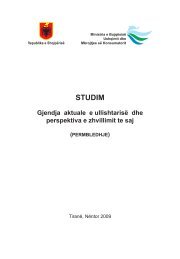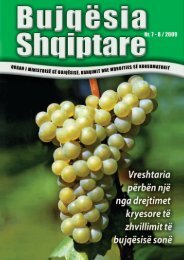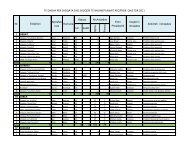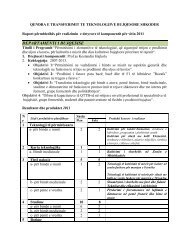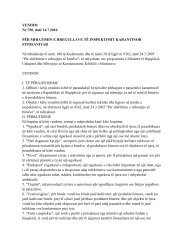MEAT Sector Analyse
MEAT Sector Analyse
MEAT Sector Analyse
- TAGS
- sector
- analyse
- mbumk.gov.al
Create successful ePaper yourself
Turn your PDF publications into a flip-book with our unique Google optimized e-Paper software.
Meat <strong>Sector</strong> Study<br />
Currently, export opportunities for agricultural and agro-industrial products are very<br />
constrained as a result of the low level of agricultural and agro-processing industrial<br />
production; the lack of trade facilitations; the low food safety standards; and the weak<br />
competitiveness. Meeting the veterinary, phyto-sanitary and food security conditions of the<br />
SAA and Interim Agreement will be a difficult challenge. The standards to be achieved relate<br />
to a very broad area covering production, marketing, safety and quality certificate conditions<br />
for goods and services, processing, and inspection and control services.<br />
According to NSDI the agricultural policy of the GOA has the following strategic priorities:<br />
• Increase financial support<br />
• Improve the management, irrigation and drainage of land<br />
• Improve the marketing of agricultural and agro-processing products<br />
• Improve the level and quality of technologies, information and knowledge applied by<br />
farmers and agro-processing<br />
• Increase the quality and safety of agricultural and agro-processing products<br />
Agriculture and fisheries<br />
Some progress was achieved in the area of agriculture and rural development policy. The<br />
Agency for Agriculture and Rural Development was set up as the paying agency to manage<br />
direct support to agriculture and rural areas. The Agency has 86 staff and operates in all 12<br />
regions of the country. It provides a good starting point towards the establishment of an<br />
IPARD Agency. Preparations for IPARD advanced with the appointment of the prospective<br />
Managing Authority in June 2009. However, the Rural Development Strategy will require<br />
substantial improvements to serve as a basis for the IPARD programme.<br />
The 2009 budget for the direct support scheme remains stable at € 7 million. Direct support<br />
to farmers resulted in an increase in plantations of permanent crops such as fruit, olive and<br />
citrus trees and vineyards. Other direct support measures covered, among other things, drip<br />
irrigation, organic certification, mushroom culture and snail breeding. There have been efforts<br />
to improve quality and marketing overall. ... The Agriculture Information Centres received<br />
additional material resources and organised promotion activities. However, land<br />
fragmentation continues to hamper efficient farming and results in low productivity and<br />
incomes. Uncertainties about property rights hinder the development of a functioning land<br />
market. Structural weaknesses such as poor infrastructure and marketing systems, lack of<br />
cooperation between producers and business sectors and insufficient knowledge about food<br />
quality and safety standards hold back the development of the agricultural sector. The share<br />
of the total budget allocated to agriculture remains small. The trade deficit in agricultural<br />
products continued to increase. Overall, the agricultural sector remains weak. It lacks<br />
competitiveness and has difficulties facing competition from imported goods.<br />
Farm level<br />
Farmers often do not respect Albanian standards and regulations (for example environmental<br />
or occupational safety) and the authorities in charge often do not enforce them properly. Also<br />
the implementation of quality standards leave some room for improvements.<br />
Common EU standards such as the Good Agricultural Practice (GAP) have no equivalent yet<br />
in the Albanian law.<br />
Processing level<br />
Meat <strong>Sector</strong> Study, page 46




